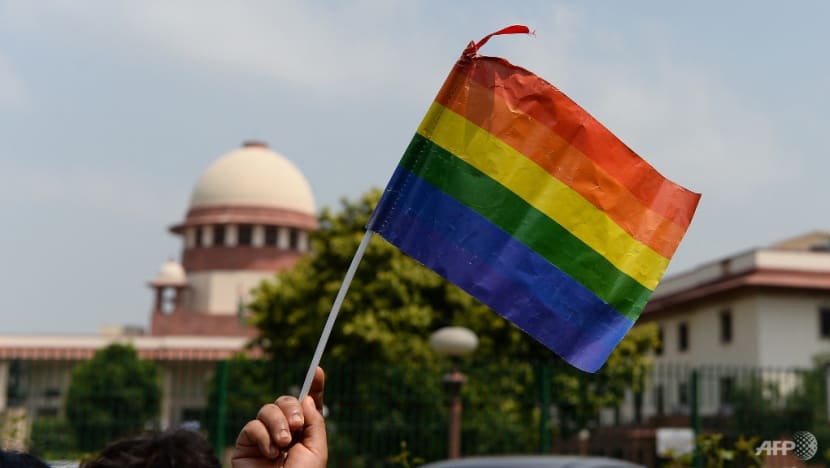Risks of legal challenge to definition of marriage illustrated by Indian Supreme Court decision: Shanmugam
India's highest court ruled last month that familial relationships may take the form of domestic, unmarried partnerships or queer relationships.

In this Sep 6, 2018, file photo, an Indian member of the lesbian, gay, bisexual and transgender (LGBT) community waves a rainbow flag outside India's Supreme Court building. (File photo: AFP/Sajjad Hussain)
SINGAPORE: The risks of a legal challenge to the current definition of marriage in Singapore have been "starkly illustrated" by an Indian Supreme Court decision to recognise different types of "families", Law and Home Affairs Minister K Shanmugam said on Thursday (Sep 1).
Mr Shanmugam said that the courts in Singapore have avoided making such rulings, leaving them instead to Parliament.
"Our courts have traditionally eschewed such an approach, and have said that these matters should be dealt with in Parliament," Mr Shanmugam said in a Facebook post, adding that planned Constitutional amendments will seek to ensure that.
India's highest court ruled last month that familial relationships may take the form of domestic, unmarried partnerships or queer relationships, and that such "atypical manifestations" of the family unit are equally deserving of social welfare benefits.
The ruling is the latest in a series of court decisions to challenge India's social norms and could have major implications for the rights of women as well as gay people.
Mr Shanmugam noted that the Indian Supreme Court decision came just a few years after it struck out part of Section 377 of the Indian Penal Code, which is similar to Section 377A of Singapore’s Penal Code that criminalises sex between men.
He reiterated that the Singapore Government will amend the Constitution to prevent the current definition of marriage from being challenged in the courts, after Prime Minister Lee Hsien Loong announced in his National Day Rally speech last week that Section 377A will be repealed.
"Currently, 'marriage' is defined (in law) as one between a man and a woman. This definition is likely, in due course, to be challenged in the courts, as being in breach of the Constitution (together with future court challenges on s377A)
"To prevent such legal challenges, the Government said last week that we will amend the Constitution – to make sure that what a ‘marriage’ should be, is decided in Parliament, and not through a challenge in the courts."
"EQUALLY DESERVING"
The Indian Supreme Court ruling stems from the case of Deepika Singh, a nurse whose employer had denied her application for maternity leave after she gave birth because she had already taken leave to care for her husband’s children from a previous marriage.
The court ruled in her favour, noting that the predominant understanding of the concept of a "family" both in the law and in society is that it consists of a single, unchanging unit with a mother and a father - who remain constant over time - and their children.
"This assumption ignores both the many circumstances which may lead to a change in one’s familial structure, and the fact that many families do not conform to this expectation to begin with," said judges Dhananjaya Y Chandrachud and AS Bopanna.
"Familial relationships may take the form of domestic, unmarried partnerships or queer relationships. A household may be a single-parent household for any number of reasons, including the death of a spouse, separation or divorce," they stated in a court document.
"Similarly, the guardians and caretakers ... of children may change with remarriage, adoption or fostering. These manifestations of love and of families may not be typical but they are as real as their traditional counterparts.
"Such atypical manifestations of the family unit are equally deserving not only of protection under law, but also of the benefits available under social welfare legislation."


















